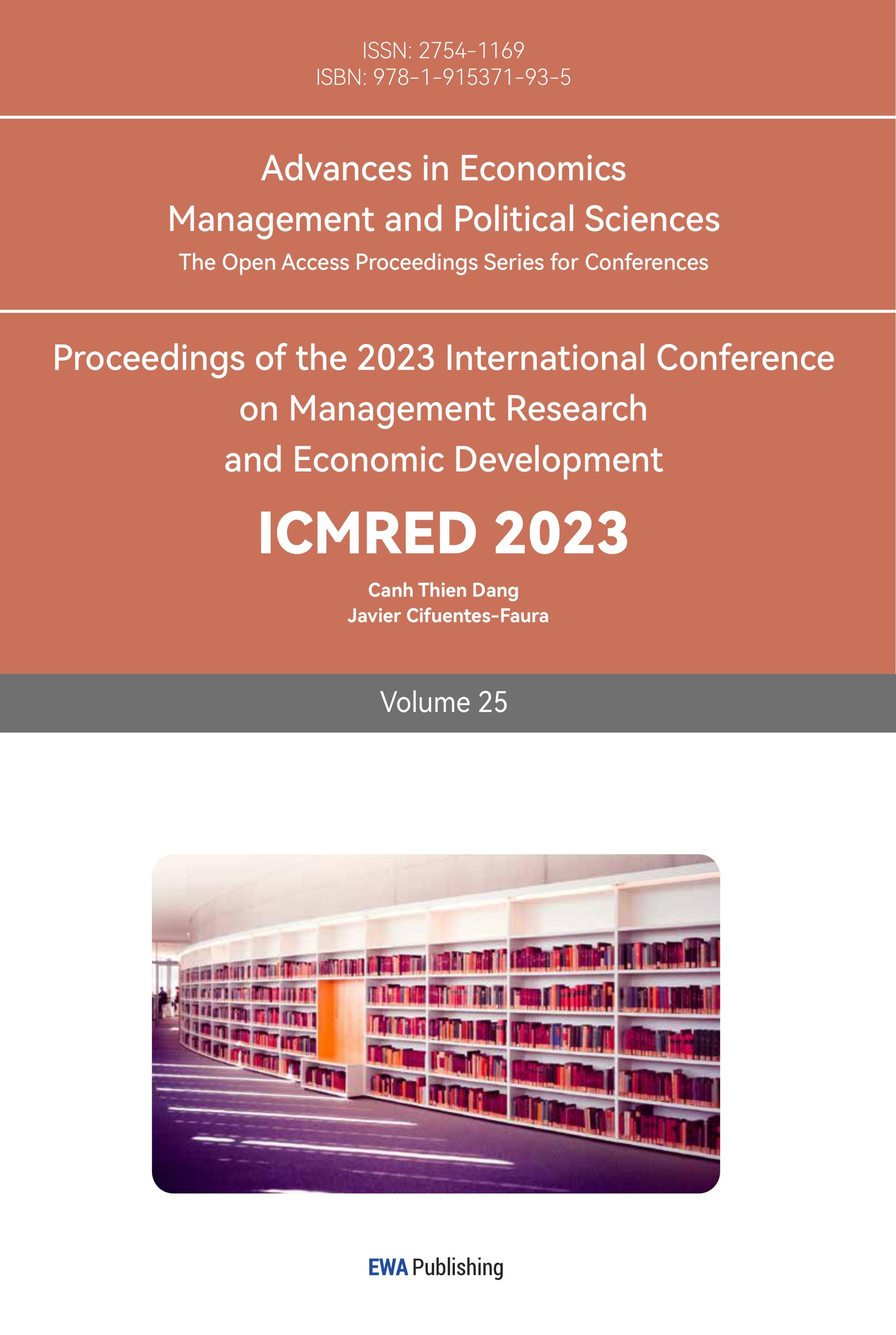References
[1]. Kalayci, C. B., Ertenlice, O., Akbay, M. A.: A comprehensive review of deterministic models and applications for mean-variance portfolio optimization. Expert Systems with Applications 125, 345–368 (2019).
[2]. Chaweewanchon, A., Chaysiri, R.: Markowitz Mean-Variance Portfolio Optimization with Predictive Stock Selection Using Machine Learning. International Journal of Financial Studies 10(3), 64 (2022).
[3]. Jensen, M. C.: Some anomalous evidence regarding market efficiency. Journal of Financial Economics 6(2), 95–101 (1978).
[4]. Basak, S., Kar, S., Saha, S., Khaidem, L., Dey, S. R.: Predicting the direction of stock market prices using tree-based classifiers. The North American Journal of Economics and Finance 47, 552–567 (2019).
[5]. Zhang, D., Hu, M., Ji, Q.: Financial markets under the global pandemic of COVID-19. Finance Research Letters 36, 101528 (2020).
[6]. Dixon, M. F., Igor, H., Paul, B.: Machine Learning in Finance. Berlin and Heidelberg: Springer International Publishing (2020).
[7]. Chen, W., Zhang, H., Mehlawat, M. K., Jia, L.: Mean–variance portfolio optimization using machine learning-based stock price prediction. Applied Soft Computing 100, 106943 (2021).
[8]. Roondiwala, M., Patel, H., Varma, S.: Predicting stock prices using LSTM. International Journal of Science and Research (IJSR) 6(4), 1754-1756 (2017).
[9]. Fischer, T., Krauss, C.: Deep learning with long short-term memory networks for financial market predictions. European Journal of Operational Research 270(2), 654–669 (2018).
[10]. Khaidem, L., Saha S., Roy, D. S.: Predicting the direction of stock market prices using random forest. arXiv preprint arXiv:1605.00003 (2016).
[11]. Markowitz, H.: Portfolio Selection. The Journal of Finance 7(1), 77–91 (1952).
Cite this article
Dong,L. (2023). LSTM-based Portfolio Optimization Strategy for SP500. Advances in Economics, Management and Political Sciences,25,194-202.
Data availability
The datasets used and/or analyzed during the current study will be available from the authors upon reasonable request.
Disclaimer/Publisher's Note
The statements, opinions and data contained in all publications are solely those of the individual author(s) and contributor(s) and not of EWA Publishing and/or the editor(s). EWA Publishing and/or the editor(s) disclaim responsibility for any injury to people or property resulting from any ideas, methods, instructions or products referred to in the content.
About volume
Volume title: Proceedings of the 2023 International Conference on Management Research and Economic Development
© 2024 by the author(s). Licensee EWA Publishing, Oxford, UK. This article is an open access article distributed under the terms and
conditions of the Creative Commons Attribution (CC BY) license. Authors who
publish this series agree to the following terms:
1. Authors retain copyright and grant the series right of first publication with the work simultaneously licensed under a Creative Commons
Attribution License that allows others to share the work with an acknowledgment of the work's authorship and initial publication in this
series.
2. Authors are able to enter into separate, additional contractual arrangements for the non-exclusive distribution of the series's published
version of the work (e.g., post it to an institutional repository or publish it in a book), with an acknowledgment of its initial
publication in this series.
3. Authors are permitted and encouraged to post their work online (e.g., in institutional repositories or on their website) prior to and
during the submission process, as it can lead to productive exchanges, as well as earlier and greater citation of published work (See
Open access policy for details).
References
[1]. Kalayci, C. B., Ertenlice, O., Akbay, M. A.: A comprehensive review of deterministic models and applications for mean-variance portfolio optimization. Expert Systems with Applications 125, 345–368 (2019).
[2]. Chaweewanchon, A., Chaysiri, R.: Markowitz Mean-Variance Portfolio Optimization with Predictive Stock Selection Using Machine Learning. International Journal of Financial Studies 10(3), 64 (2022).
[3]. Jensen, M. C.: Some anomalous evidence regarding market efficiency. Journal of Financial Economics 6(2), 95–101 (1978).
[4]. Basak, S., Kar, S., Saha, S., Khaidem, L., Dey, S. R.: Predicting the direction of stock market prices using tree-based classifiers. The North American Journal of Economics and Finance 47, 552–567 (2019).
[5]. Zhang, D., Hu, M., Ji, Q.: Financial markets under the global pandemic of COVID-19. Finance Research Letters 36, 101528 (2020).
[6]. Dixon, M. F., Igor, H., Paul, B.: Machine Learning in Finance. Berlin and Heidelberg: Springer International Publishing (2020).
[7]. Chen, W., Zhang, H., Mehlawat, M. K., Jia, L.: Mean–variance portfolio optimization using machine learning-based stock price prediction. Applied Soft Computing 100, 106943 (2021).
[8]. Roondiwala, M., Patel, H., Varma, S.: Predicting stock prices using LSTM. International Journal of Science and Research (IJSR) 6(4), 1754-1756 (2017).
[9]. Fischer, T., Krauss, C.: Deep learning with long short-term memory networks for financial market predictions. European Journal of Operational Research 270(2), 654–669 (2018).
[10]. Khaidem, L., Saha S., Roy, D. S.: Predicting the direction of stock market prices using random forest. arXiv preprint arXiv:1605.00003 (2016).
[11]. Markowitz, H.: Portfolio Selection. The Journal of Finance 7(1), 77–91 (1952).









